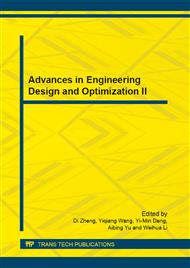p.918
p.922
p.926
p.930
p.934
p.938
p.942
p.946
p.950
Determination of Optimal Temperature for Defect-Free Casting of Aluminium in the LP-LFC Process
Abstract:
Fluidity of ZL101 aluminium alloys in the low-pressure lost foam casting (LP-LFC) process has been investigated by altering various temperature variables. The experimental results indicate that the LP-LFC process had fine fluidity, and the pouring temperature was lower than conventional lost foam casting. The effect of the metal temperature on the fluidity is marginal in the LP-LFC process. Excessive pouring temperature not only aggrandizes energy consumption but also deteriorates porosity defect. The success of casting cooling fin demonstrates the advantages of LP-EPC process in producing high-complicated castings.
Info:
Periodical:
Pages:
934-937
Citation:
Online since:
September 2011
Authors:
Price:
Сopyright:
© 2012 Trans Tech Publications Ltd. All Rights Reserved
Share:
Citation:


